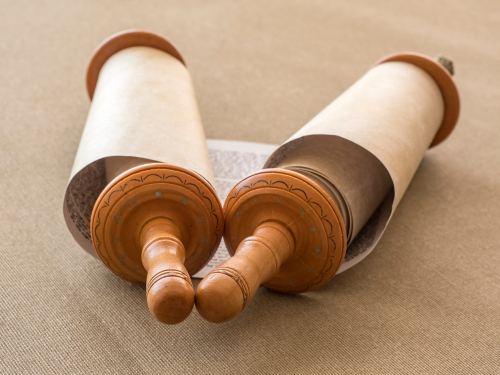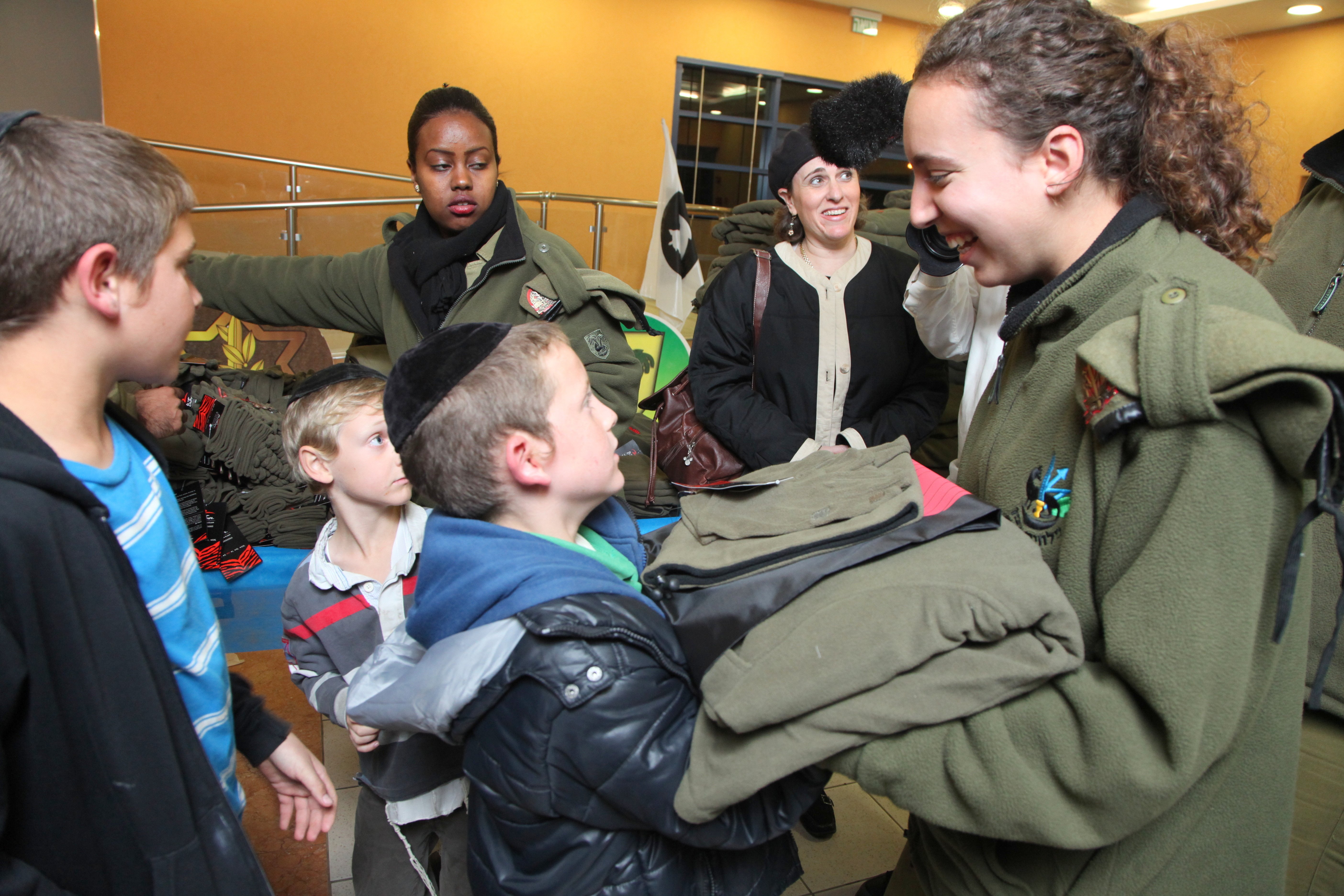Approximately 1,000 people wrote a letter at the time of its completion.
By Deborah Fineblum, JNS
Why is this Torah different from all other Torahs?
It may well be the fact that inside it is the pain of more than 1,000 Israelis whose lives have been forever changed by this war.
When Nogah Safer, whose day job is in hi-tech but whose heart is in his work as a sofer—a Torah scribe—started writing this scroll six years ago, he never expected that those adding letters to it would eventually include Israeli soldiers on the Gaza border and survivors of the Oct. 7 Hamas massacre, the deadliest day in Israel’s history.
Beginning two and a half months ago, Safer says he felt a new urgency to complete the Torah scroll. And mornings often found him driving away from the Pardes Hanna home he shares with his wife and three children to destinations around the country where he knew there were many war-impacted Israelis. In the end, some 1,000 added a letter.
Last Thursday night, after Safer inked the final one of the 304,805 letters in the Torah (it’s a lamed, by the way, ending the word “Yisrael“), the scroll was rolled up and dressed in its blue velvet mantle to be escorted by hundreds of celebrants through the streets of Pardes Hanna. Dancing and singing, they made their way to the Torah’s new home at the Hamama, a Breslov-Carlebach congregation in what may be the only synagogue in existence where a crystal chandelier hangs from the peak of a tremendous tent.
Safer is a Boston native—his family immigrated to Israel when he was 12—who graduated from Bezalel Academy of Art and Design in Jerusalem and worked as an artist before launching his hi-tech career or beginning his scribe training in 2010. Now 38, this is his first Torah.
He had, in fact, gotten all the way up to Deuteronomy, the final book of the Five Books of Moses, “when something told me not to leave 50 letters for others to finish but more like 2,000,” he says. And then came Oct. 7, and he began to understand why.
Because it’s only when the soldiers and survivors began adding letters, says Safer, that he saw the true power the Torah has to unite Jews. “No matter where we took it, no matter how religious or nonreligious they were, everyone was drawn to it like a magnet,” he said. Including waiting in long lines to add their letter.
And the places themselves touched him. “Kibbutz Be’eri was like something out of a Hollywood movie set—there was a shot-up nursery school with broken toys everywhere. It’s not like going to a Holocaust museum and seeing what happened to our people 80 years ago. This is happening to us now,” he said.
Imri Horowitz was born and raised on Kibbutz Kfar Aza but was away with his family on Oct. 7, for Shabbat and Simchat Torah. He considers it a “total miracle” that his 81-year-old parents were unharmed the day 67 of their neighbors were murdered and 16 were taken hostage.
But when Safer unrolled the Torah at the hotel where the Kfar Aza residents are living until it’s safe to go back, “Even though most of our kibbutz isn’t so connected to Judaism, they all wanted to be a part of it,” said Horowitz.
And when it was his turn to sign, he named all his 67 murdered neighbors and the 16 hostages. “I felt like I was whispering in God’s ear, like it was a gift to their souls. Just saying their names, I could feel the power of it,” he said.
So could Yonah Greenberg (whose name has been changed for security reasons), an IDF soldier serving outside Gaza. “Seeing 200 guys stand in line to add their letter, religious and not religious, you could tell they felt a deep desire to be part of the Torah, in whatever way they could,” says Greenberg. “It felt like we were writing the Torah of the Moshiach that will be sent to Jerusalem when the Temple gets rebuilt.”
Indeed, many of the soldiers included their personal prayers—devarim meha lev, words from the heart, in the blessing they made before adding to the scroll: “I hereby write for the sake of the holiness of the Torah, the Eternal of Israel, in the name of all of Israel.” Which is why Safer calls his scroll Torah Netzach Yisrael, the Eternal Torah of Israel.
The scene Safer and friends encountered at the Nova festival memorial may have been different from that at the base and the kibbutz survivor hotel, but the upshot was the same.
“It started out as a slow trickle of people coming over to the Torah, but then more and more wanted to add their letter,” said Akiva Gersh, who accompanied Safer that night. Including a young woman in a wheelchair, having lost a leg on Oct. 7. “So many of them said, ‘This is to honor my friend who was killed’ or ‘who was taken by Hamas and still missing.’” And Safer ended up writing with them for three hours straight.
“That night I got the feeling that, at a time of national pain, this is a Torah of healing, because we’re realizing our differences mean nothing,” added Gersh. “Guys with tattoos and body piercings asked, ‘Can I?’ ‘Of course,’ we said. ‘Everyone’s invited.’ Jewish tradition teaches us: Every Jew is like a letter in the Torah. And that night it felt like everyone who came up to the Torah was searching for their letter.”
“I knew it would be the opportunity of a lifetime,” said Tovah Goldfine of Caesarea, who was among the last to add her letter last Thursday. “A scroll that soldiers touched and kibbutz survivors touched and people from that nightmare of a party touched, it reminds us of the connection we all share to our God, even in this hard time. And to participate as a woman, it’s an incredible honor that will live with me forever.”
“In a way this Torah is a healing for what happened to us on Simchat Torah,” said Rabbi Tuvia Aronson, who accompanied Safer on some of his Torah travels. “A tikkun —a fixing—coming through the blessing of unity. When we can really see each other, the negativity falls away and the light can come in.”
“I don’t care what you do or how religious you are,” said Safer, six years after he wrote the bet that’s the first letter in Genesis. “We’ve gotten back to a place where it doesn’t make any difference, because if you’re a Jew something about the Torah pulls you to it. It’s like when you approach it, you’re already in a place where our differences melt away.”
Keep Israeli Soldiers Warm - Send Winter Jackets!
We are honored to thank the young men and women of the IDF who risk their lives every day to defend the citizens of Israel.
Join us in sending winter care packages and personal notes of support to Israeli soldiers who are out in the cold all day.
Warm up a soldier's heart with essential winter wear including fleece jackets, hats, gloves and more. Keep an entire unit warm!
THE SOLDIERS REALLY APPRECIATE YOUR LOVE AND CONCERN!



